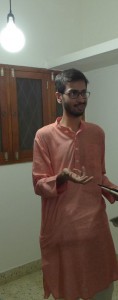The well belongs to the landlord (Kuan Thakur Ka)
by Om Prakash Valmiki, translated by Archit Guha
Chulha mitti ka
Mitti Talaab ki
Talaab Thakur Ka
The stove is made out of mud
The mud is sourced from the lake
The lake belongs to the landlord
Bhukh Roti Ki
Roti Bajre Ki
Bajra Khet Ka
Khet Thakur Ka
(We have) A hunger for bread
Bread made of pearl millet
Pearl millet grown in the fields
The field belongs to the landlord
Bail Thakur Ka
Hal Thakur Ka
Hal Ki Mooth Par Hatheli Apni
Fasal Thakur Ka
The bull belongs to the landlord
The plough belongs to the landlord
The hands on the shaft of the plough are ours
The harvest belongs to the landlord
Kuan Thakur Ka
Pani Thakur Ka
Khet-Kalihan Thakur Ke
Galli-Muhalle Thakur Ke
Phir Apna Kya?
Gaon?
Shehar?
Desh?
The well belongs to the landlord
The water belongs to the landlord
The crops and the fields belong to the landlord
The lanes that run through these neighbourhoods belong to the landlord
Then what is ours?
The village?
The city?
The nation?
![]()
The Late Om Prakash Valmiki (1950-2013) hailed from Muzzafarnagar in Uttar Pradesh. He worked in the Government Ordnance Factories Board in India, but also published prolifically. He wrote self-reflexively about the Dalit experience and indicted the caste based social order through his work. In 1997, he published his autobiography, Joothan, which remains one of the most incisively honest and acclaimed accounts of Dalit life in the literary canon. “Kuan Thakur Ka” is from his early writings, in the 1980s, and reflects the agency in the face of indignation and stigma that marks Dalit lives. These poems are deeply and viscerally embedded in the politics of production and possession in relation to the systems of domination that caste has engendered over two millennia in South Asia.
 Archit Guha has lived, studied, and worked in India, the US, and the UK. He continues to lead an odyssean existence and remains feverishly engaged with the reticulations of South Asian history and politics with special interests in knowledge production— (natural and social) scientific, literary, legal, and cultural—and their translation and migration across continua of spaces and times.
Archit Guha has lived, studied, and worked in India, the US, and the UK. He continues to lead an odyssean existence and remains feverishly engaged with the reticulations of South Asian history and politics with special interests in knowledge production— (natural and social) scientific, literary, legal, and cultural—and their translation and migration across continua of spaces and times.
Image Credit: Image credit: © 2015 Marialaura Ghidini



